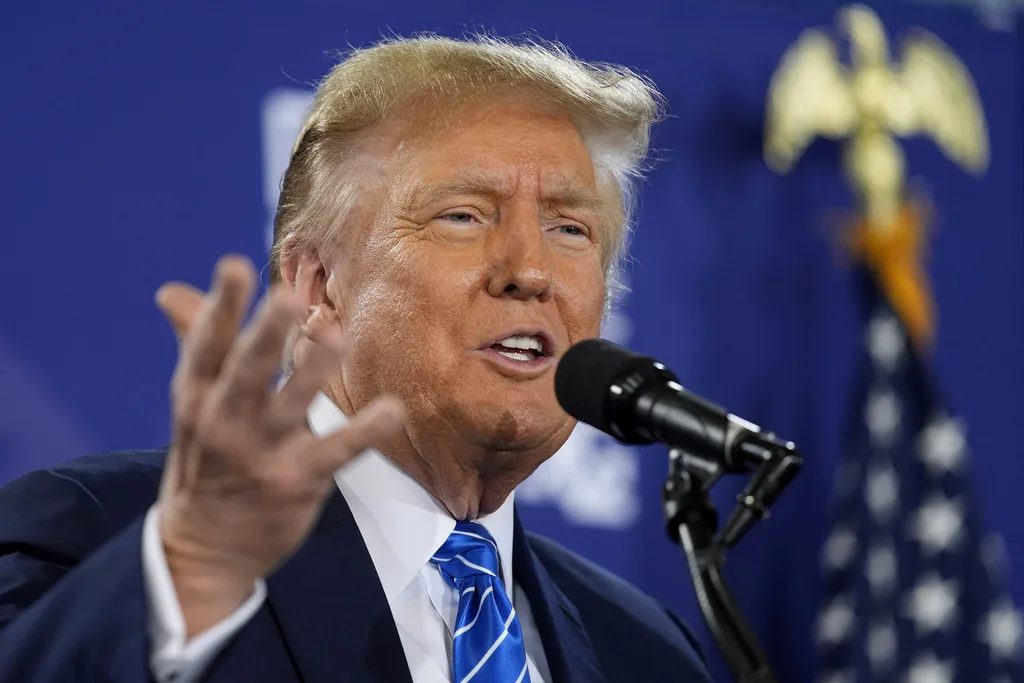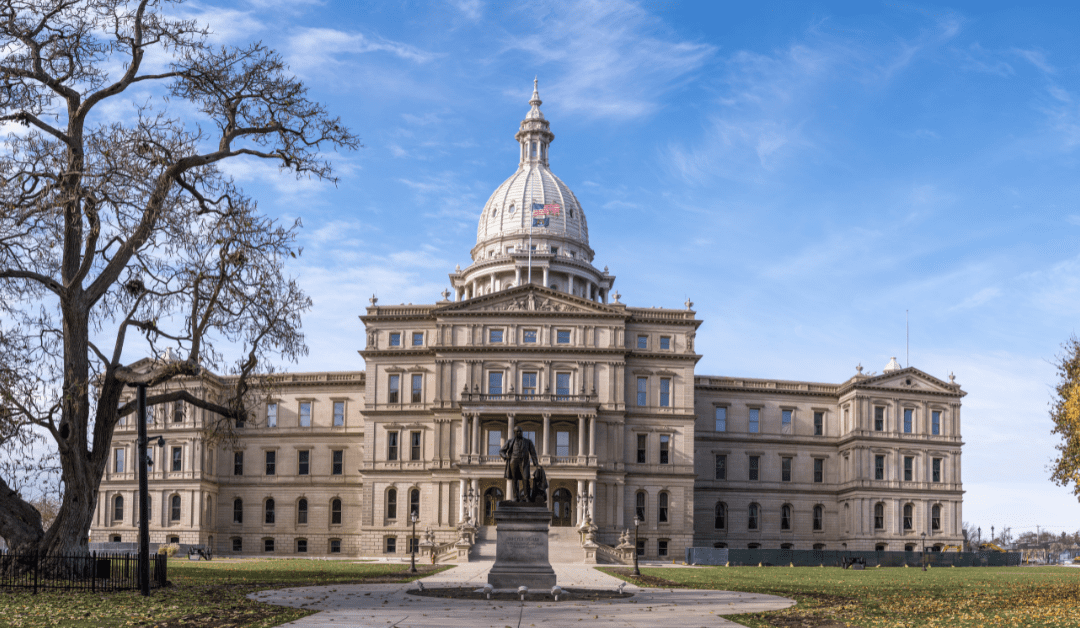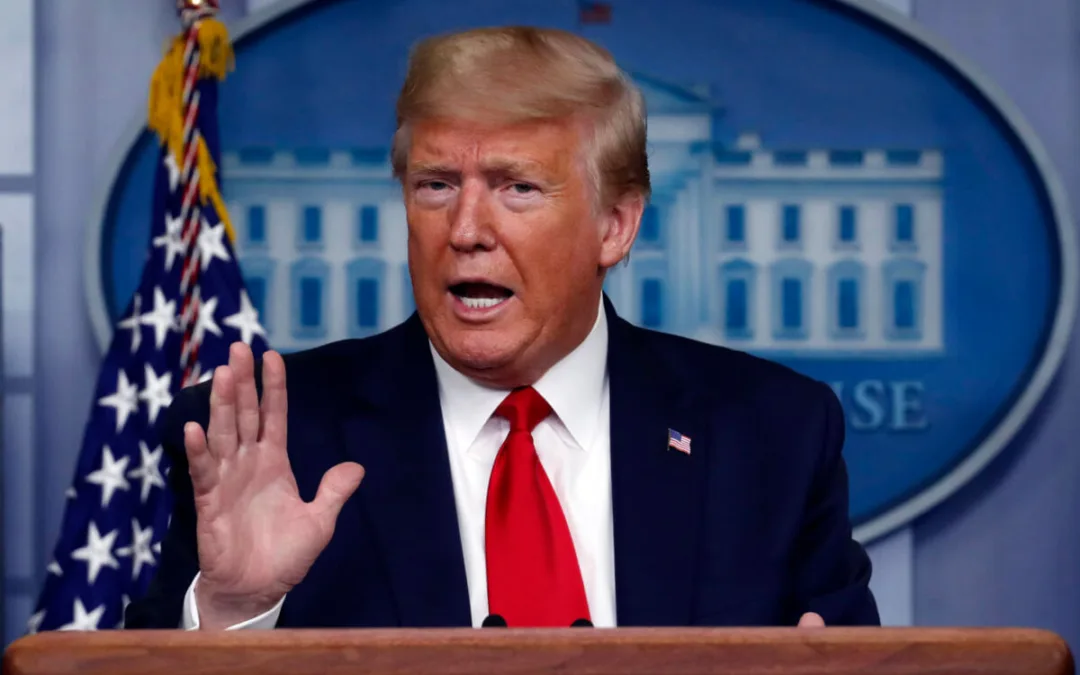
Trump’s policies made more than eight million workers ineligible for overtime pay, allowed for the outsourcing and offshoring of American jobs, made it harder for workers to join a union, and failed to protect American workers during the pandemic. (AP Photo/John Locher, File)
During his time on the campaign trail, Donald Trump has sought to refashion his record and image as being a pro-worker candidate—one that wants to protect American labor.
And if a recent focus group of voters conducted by NBC News is any indication—Trump’s PR campaign seems to be working.
“I think he’s pro-worker. I think he knows how to get jobs there,” one Michigan voter said about Trump.
“I think he’s more about the workers, as a whole,” said another.
But Trump’s actual record on workers undercuts his stump speech and his claims of being a populist, pro-worker candidate.
Let’s take a look:
Anti-worker policies
During his time in the White House, Trump’s administration embraced numerous anti-worker policies.
His Labor Department changed the rules of who qualified for overtime pay in 2019, making more than eight million workers ineligible for overtime, costing them a combined $1 billion-plus per year in lost wages. Trump also opposed legislation that would have raised the national minimum wage to $15 per hour while in office.
Additionally, his administration rolled back rules that made it more difficult to award federal contracts to companies that were repeat violators of sexual harassment laws, racial discrimination laws, wage laws, and laws protecting workers’ right to unionize. In other words: he made it easier to award federal contracts to companies that repeatedly violated these laws.
Trump also repealed regulations that protected vulnerable workers from amassing debts from payday loans, which are short-term, high-cost loans that are typically due the following payday.
He also made it a habit of making promises he couldn’t keep to workers.
In 2017, he vowed to stop General Motors from closing a massive assembly plant in Lordstown, Ohio. During a speech in Youngstown, he promised Lordstown residents that manufacturing jobs would be returning to the area, saying “Don’t move. Don’t sell your house.”
Despite his promises, GM closed the plant two years later. The company that bought the plant, Lordstown Motors, hired thousands of employees, but has since filed for bankruptcy and halted operations.
Trump also promised he would impose tariffs on vehicles coming to the United States from Mexico. In 2020, however, his update of the North American Free Trade Agreement, which has long been criticized by blue collar workers, imposed no such tariffs.
While on the campaign trail in Michigan in 2020, Trump also claimed that he “saved the US auto industry.” In reality, Michigan lost 1,900 auto manufacturing jobs, or 4% of the total, from Feb. 2017 to Feb. 2020, according to the Bureau of Labor Statistics.
Encouraging outsourcing and offshoring
As a candidate, Trump promised to “stop jobs from leaving America” and to put American workers first.
Throughout his presidency, however, he encouraged the outsourcing and offshoring of jobs, taking jobs away from American workers.
The former president pushed for a corporate tax cut bill that gave companies a 50% tax break on their foreign profits, making it financially advantageous for them to move jobs overseas. The “Tax Cuts and Jobs Act,” which Congress passed in 2017, also allows companies to be tax exempt from a 10% return on tangible investments that are made outside the US.
Experts at both the Tax Policy Center and the Institute on Taxation and Economic Policy (ITEP) have noted that since this legislation created additional incentives for companies to move their jobs overseas, it accelerated the offshoring of jobs and operations.
The largest beneficiaries of the Republican tax bill—such as Wells Fargo—were already aggressively offshoring US jobs for years. Rather than hold them accountable or address that offshoring, the tax law rewarded those efforts with billions in corporate tax savings.
On two separate occasions, a group of lawmakers also wrote to Trump while he was president, urging him to issue an executive order that would have prevented federal contracts from going to companies that send call center jobs overseas. Trump never responded.
According to a 2020 report from the nonprofit consumer advocacy organization Public Citizen, 200,000 American jobs were offshored during Trump’s presidency, and he awarded more than $425 billion in federal contracts to the corporations responsible for doing so, including Boeing, General Electric, and United Technologies.
An ugly record on labor unions
Trump also has a decades-long hostility to labor unions.
In 2008, Trump criticized pay raises for United Auto Workers (UAW) union members.
“They get their little 5%. They get another 2%. They get another 3%, 4% … and all of a sudden they’re making more money than the people that own the company,” he said.
When he took office in 2017, Trump’s tune didn’t change.
Trump’s National Labor Relations Board (NLRB), which oversees labor relations at most businesses nationwide as well as the president’s judicial appointments, issued major setbacks to unions across the country.
Trump-appointed NLRB members made it more difficult for unions to win representation at non-union workplaces, which in turn extended the amount of time between when a union files for representation and when union elections are held. As a result, management was granted more time to campaign against unions and their organizing campaigns.
Trump’s NLRB members also allowed for the misclassification of workers, which threatened their ability to join a union in the first place.
Misclassification of employees as independent contractors is a rampant problem that, according to the Economic Policy Institute, “robs employees of their rights under the NLRA,” or the National Labor Relations Act, as independent contractors are not covered or protected by the legislation. Congress passed the bill in 1935 and it guaranteed the right of private sector employees to organize into unions, collectively bargain, and go on strike.
Earlier this year, the UAW endorsed President Biden for president. While announcing the union’s support for Biden, UAW President Shawn Fain took the opportunity to criticize Donald Trump’s record on unions.
“Donald Trump is a scab,” he said. “Donald Trump is a billionaire, and that’s who he represents. If Donald Trump ever worked in an auto plant, he wouldn’t be a UAW member — he’d be a company man trying to squeeze the American worker.”
Sparring with the United Auto Workers’ union
Fain’s endorsement came just months after his union’s 2023, during which Trump took repeated shots at both the UAW’s leadership and the strike in general.
The UAW decided to strike because it wanted “The Big Three”–General Motors, Ford, and Stellantis–to boost worker pay and scrap their “two-tiered wage structure,” which effectively allowed certain workers to make less than their colleagues due to an outdated worker classification system.
The former president warned US auto workers that striking wouldn’t be in their best interest.
“The autoworkers will not have any jobs, Kristen, because all of these cars are going to be made in China. The electric cars, automatically, are going to be made in China,” Trump told NBC News’ Kristen Welker in September.
Trump specifically criticized UAW President Shawn Fain saying he wasn’t “doing a good job representing his union.”
Furthermore, Trump urged UAW members to stop paying their union dues.
“You should not pay your dues because they’re selling you to hell. You’re going to be going to hell. You’re not going to have any jobs. All those cars are going to be made in China,” he said.
As of Nov. 2023, President Biden’s Inflation Reduction Act has driven $92 billion in investment into the electric vehicle sector in the United States, and has created 84,000 manufacturing jobs.
The UAW ratified new contracts with Ford and Stellantis in Nov. 2023; the companies agreed to end the wage system that was used to pay certain workers less, and agreed in principle to bring new EV battery plants into the national union contract. The companies also agreed to raise pay for top-scale assembly plant workers, who also received immediate 11% raises. They will earn roughly $42 an hour when the contracts expire in April 2028. A similar deal was reached with General Motors.
Fain, president of one of the largest labor unions in the United States, contrasted President Joe Biden and Donald Trump in an exclusive interview with The Nation last month.
“There’s a huge contrast between these two candidates,” he said. “One stands with working-class people, and one represents the billionaire class—and is a member of the billionaire class— and doesn’t give a damn about working-class people.”
The failure of COVID-19
Perhaps Trump’s most notable blunder when it comes to protecting American workers, was his handling of the COVID-19 pandemic.
The former president failed to prepare the United States for the pandemic in the first place, despite the fact that he had been warned about the virus for months leading up to its outbreak in the US.
Trump also failed to secure enough Personal Protective Equipment (PPE) for essential workers, putting their lives in danger. He furthermore opposed The Heroes Act, which would have given these essential workers premium “hazard” pay and expanded their paid leave and unemployment insurance.
Trump also refused to invoke the Defense Production Act to put manufacturing workers back to work making PPE and ventilators. Instead, he used the bill to force meatpacking plants to resume operations despite the fact that thousands of workers were contracting COVID-19 due to unsafe working conditions.
Trump’s OSHA, or Operational Safety and Health Administration, also lowered its standards meant to protect workers from getting sick. These lowered standards also gave employers a free pass if they failed to meet them.
“Donald Trump told us in 2016 he would stand with workers,” The American Federation of Labor and Congress of Industrial Organizations said in a statement in September. “He lied. The difference now is that he has a record he can’t hide from. And that record was catastrophic for workers.”
Politics

Slotkin urges Michiganders to compare prices before buying prescription drugs
A law sponsored by Congresswoman Elissa Slotkin is helping patients compare prices for different prescription drugs at different pharmacies—saving...

‘Melody’s Law’ would explicitly criminalize necrophilia in Michigan
BY ANNA LIZ NICHOLS, MICHIGAN ADVANCE MICHIGAN—There is no law on the books in Michigan that expressly criminalizes engaging in sexual conduct with...

SEIU workers ahead of NFL Draft: We are ‘the backbone of Detroit’
BY KEN COLEMAN, MICHIGAN ADVANCE MICHIGAN—A day ahead of the National Football League annual draft being held in Detroit, Service Employees...
Local News

4 Michigan dispensaries that will deliver weed straight to your doorstep
MICHIGAN—If you’ve ever dreamed of purchasing quality weed without ever having to leave your house, then you’re in luck. Michigan dispensaries have...

The 9 best pizzas in Michigan, according to our research
When it comes to finding the best pizza in Michigan, the options are endless. From the bustling city of Detroit to the quaint town of Cadillac,...






